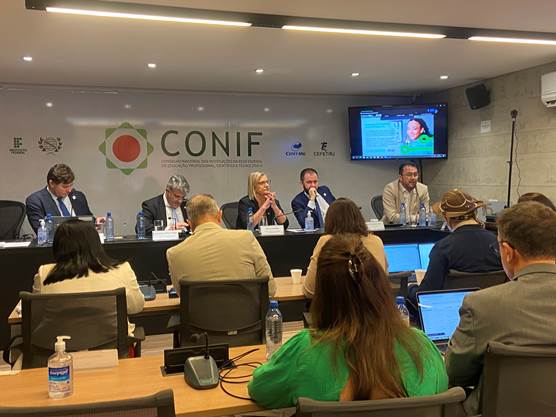RNP presents progress on Conecta Rede program at Conif session
RNP presented the results achieved by the Conecta Rede program during a session of the National Council of Institutions of the Federal Network of Professional, Scientific and Technological Education (Conif) held on July 10, at the organization's headquarters in Brasília. The presentation was requested by the Secretariat of Professional and Technological Education of the Ministry of Education (Setec/MEC) and highlighted the optimization of processes, digital transformation and resource savings.
The program promoted by the MEC aims to strengthen the innovation ecosystem of the Federal Network through several technological modernization initiatives. In the first year of implementation, technological advances resulted in gains in scale and operational efficiency, generating significant savings for the state coffers.
RNP Solutions Manager Roosevelt Benvindo presented the benefits of the Digital Diploma solution for undergraduate courses, which generated an estimated savings of R$2.6 million, based on the almost 36 thousand diplomas issued until June 2024. The backup solution, expected to be adopted by 17 institutes by the end of July, should generate annual savings of R$5 million when implemented across the network. The Moodle solution will be in use by 17 institutions by the end of July.
Roosevelt also highlighted the Educational Consulting offered by the Escola Superior de Redes (ESR), which will standardize the functions of IT professionals in the network and identify training gaps. He also mentioned the goal of prospecting and modeling, including the recent approvals of Digital Diploma solutions for technical courses and the computing resource availability service. This initiative will benefit the entire Federal Network, offering hosting and computing capacity for critical services.
In addition to the results of the first year of the program, new prioritized solutions were presented with the aim of promoting the experimentation, modeling and validation of digital applications according to the needs and prioritizations identified by the institutions.
The actions highlighted include the implementation of cybersecurity and secure storage measures, with the aim of increasing the level of security and privacy, management of digital collections and data storage. This entire process is conducted collaboratively, prioritizing the urgent needs of the network.
Prioritized actions:
Information Security:
In the area of Information Security, a proposal was drawn up to serve the Federal Network, offering consultancy aligned with the priorities established by the committee, considering the level of maturity of the institutions in relation to security and privacy. This work is in line with recent maturity surveys carried out by the Federal Court of Accounts (TCU) and the Ministry of Management and Innovation (MGI).
Provision of Colocation infrastructure:
A colocation infrastructure provision service was modeled through RNP’s National Data Centers (CND’s), with the proposal of supplying racks. This solution reduces the burden and optimizes the use of local infrastructure spaces of institutions, providing resources for housing equipment in a robust and secure cloud infrastructure. The initiative benefits institutions by reducing the need to modernize data centers by offering a low-cost, high-added -value solution.
Modeling the Digital Desk solution:
The Digital Desk solution, an initiative of the Federal University of Rio Grande do Norte (UFRN), aims to securely and digitally process documents at educational institutions, providing agility and sustainability. In this context, the modeling of the solution, prioritized by the Conecta Rede program committee, aimed to make it available on a large scale for the entire Federal Network.
The technical modeling of the Digital Desk solution has been completed, preparing it for migration to a cloud environment, which will provide greater flexibility and scalability.
Modeling the Academic Records solution:
Following the publication of Ordinances MEC 360/2022 and MEC 613/2022, which address the conversion of academic records to digital media and establish deadlines for the implementation of electronic management of academic documents in higher education institutions in Brazil, the Academic Records solution gained prominence. In this perspective, the program's strategic committee requested the development of a service that meets the requirements of these ordinances, providing a standardized and secure solution for institutions. A detailed action plan was drawn up to gather requirements, which is essential for technical modeling and future service provision.
The new demands identified aim to ensure that institutions comply with the best solutions focused on operational improvement, gains in scale and cost-effectiveness.
The focus on joint construction is the great differential of Conecta Rede, so that institutions develop solutions for their own needs and that they are continuous in the process of digital transformation and decisions about investment of resources and actions that should be prioritized.
At the end of the presentation, the rectors praised the program and suggested new services and solutions. Roosevelt Benvindo highlighted the importance of presenting preliminary results to demonstrate the benefits of digital transformation, process improvement and savings in public resources, reinforcing RNP's role in supporting public policies.
